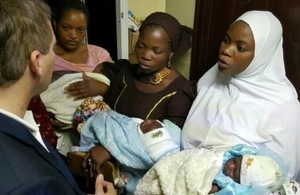Shapps: Africa can pioneer a solar revolution
Solar power can help solve Africa's energy issues, Grant Shapps has said during a visit to Nigeria.

Grant Shapps meets with mothers in Nigeria whose babies were born in a hospital lit by solar electricity as part of a UK-backed clean energy scheme. Picture: Michael Haig/DFID
Reliable solar power systems can help some of Africa’s poorest to cope with the continent’s chronic power shortages, Minister of State for Africa Grant Shapps has said during a visit to Nigeria.
Speaking during a tour of solar energy facilities backed by the UK Government in Lagos, he called for international backing of solar energy projects to speed up access across the continent.
More than half of the population of Nigeria have no access to electricity. Per head of the population, Nigeria’s energy access is one of the lowest in the world.
Grant Shapps said:
Blackouts and costly generators are a daily reality for millions of Nigerians. Many more simply have no access to energy and rely on candles or kerosene. This is holding back an entire nation and continent from reaching its full potential.
We simply cannot wait for full national grids to show up one day. The technology, expertise and knowledge to fix this is available and is ready to be deployed right now.
So we’re going to harness this opportunity and get more people into this exciting energy market. Next week I will bring together African politicians, investors and solar experts in London to kickstart our Energy Africa campaign to bring power to millions of people.
Agreed in New York last month, the UN’s new Global Goals made a commitment to provide universal energy access in Africa by 2030. On the current trajectory, this will not be achieved until 2080.
During his visit, Minister for International Development Shapps visited a Lagos health clinic run entirely by solar energy.
Registering 60,000 ante-natal patients every year, the centre only had two hours of electricity every day before the panels were installed last year. This severely limited their ability to treat patients. Drugs could not be safely stored in refrigerators, the laboratory stopped and births at night had to rely on candles or kerosene lamps, increasing the risk of complications or ill health.
The installation of a 240 x 300 Watts solar panels and batteries ensures a regular and completely reliable energy supply throughout the day and night.
Supported by an investment from Britain and the Lagos State Government, a further 10 health centres and 172 schools across the state have been installed with solar energy systems to provide reliable and instant access to vital electricity.
At next week’s Energy Africa campaign launch Shapps will launch what DFID describes as an energy revolution across Africa.
General media queries (24 hours)
Email mediateam@dfid.gov.uk
Telephone 020 7023 0600
If you have an urgent media query, please email the DFID Media Team on mediateam@dfid.gov.uk in the first instance and we will respond as soon as possible.